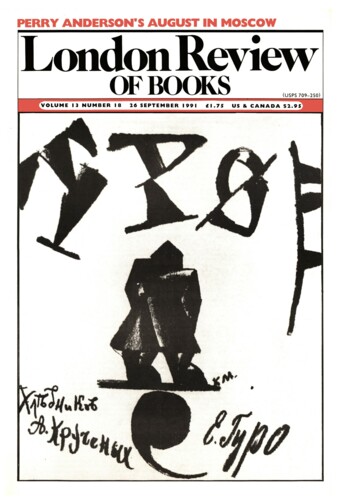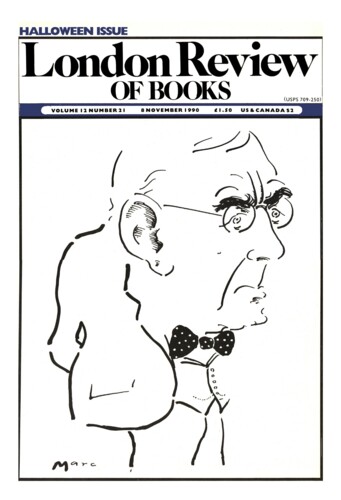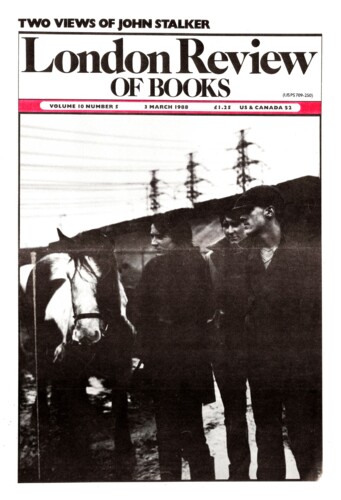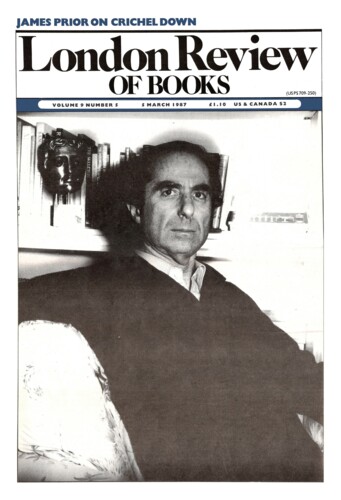Michael Neve
Michael Neve is a lecturer in the History of Medicine at University College, London.
Something an academic might experience
Michael Neve, 26 September 1991
A small news item with a large history behind it: John Sylvester, an inhabitant of Lancashire, was released last month from a life spent in mental hospitals and institutions, aged 81. He had been incarcerated when he was six years old, and his offence had been the stealing of an apple. His mother had died soon after this first confinement, and so when declared ‘mentally fit’ in 1929, he became the responsibility of his father, who was disabled and could not take up his case. Sylvester was 19 at the time, and speaks of an entirely wasted life – a view shared by the social services who now look after him.’
Triples
Michael Neve, 8 November 1990
It is the great merit of the literature on ideas of ‘the double’ that asking questions about the mysteries of the Devil gets such good historical answers. From Tymms (1949) to Miller (1985) to the touchingly named Herdman (is he trying to keep us safe, inside the yard?) the literary study of doubles roots itself in Christian accounts of the world, describing how, by trick, by election or by sin, characters break open, split apart, see things that may be themselves, even meet the return of their true selves. And, of course, get to meet the Devil. Over a dram, or out in the gale, or in some German place of retreat and learning, the fiendish splits are revealed. The time may be the early 19th century, the cultural atmosphere Romantic, but the origin lies in the Christian account of the struggle for the soul. Despite some of the amazing speculations in Karl Miller’s 1985 study, the doubles question does not flourish as an Enlightenment theme, and receives a dismissive scientific ‘explanation’ in the post-Romantic psychology of the 19th century. It is, above all, a discussion within Calvinism, within esoteric Christianity, and within European Romanticism.
Time to think again
Michael Neve, 3 March 1988
It used to be argued that a feature of Conservative political philosophy was its fundamental irrelevance to the main task of acquiring – or re-acquiring – power. The heady idealism that characterised a great deal of 18th and 19th-century political thought, in Britain and Europe, was itself an index of the distance between such thought (and such thinkers) and the centres of political control. In the gap between thought and action, those anxious to achieve authority spent their lives theorising: Conservatives, with their sense of natural aristocracy, need not devote time to the empty business of imagining what power might be like, or ought to be like. In Britain especially, it was simply a question of getting on with the practical job, the job as determined by political economy, or something conceived of as ‘common sense’. Philosophy, political philosophy, was the product of alienation, of exclusion. At the centre, where nature could take its course, the forlorn seeker after complex thought was absent. Of course there was Coleridge, but he was incomprehensible. The rest was just the written evidence for the fact of endless liberal dissatisfaction. Those who can, do. Those who can’t, write On Liberty.’
Contra Galton
5 March 1987
Read anywhere with the London Review of Books app, available now from the App Store for Apple devices, Google Play for Android devices and Amazon for your Kindle Fire.
Sign up to our newsletter
For highlights from the latest issue, our archive and the blog, as well as news, events and exclusive promotions.





